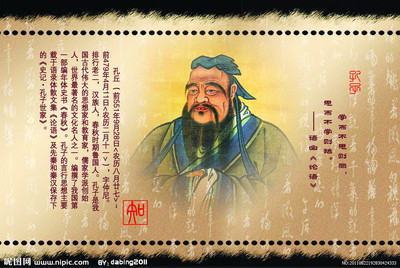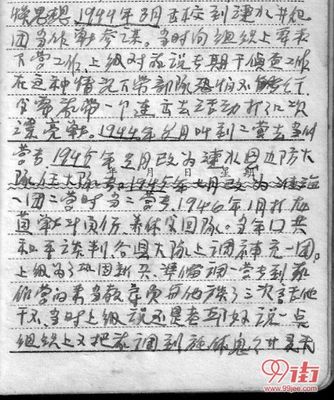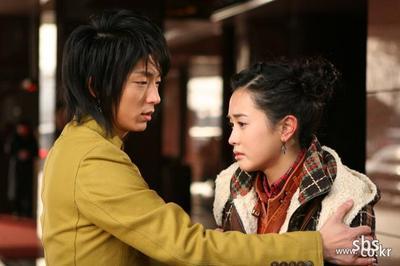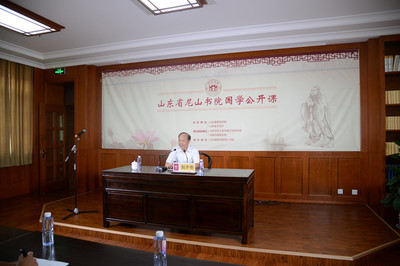If an old dog barks, he gives counsel.
爱之,能勿劳乎?忠焉,能勿诲乎? 孔子说:“爱他,就不能让他贪图安逸。忠于他,就不能不对他进行教诲。”
Confucius said, “To love him means not to let him indulge in comfort; to be loyal to him means to teach him.”
饱食终日,无所用心,难矣哉! 孔子说:“整天吃饱饭没事干的人,不会有什么出息。”
He who always has full stomach but does nothing meaningful is simply a good-for-nothing.
博学于文,约之以礼,亦可以弗畔矣夫! 孔子说:“君子广泛地学习文化典藏,并用礼来约束自己,就可避免离经叛道了。”
A gentleman will not go astray so long as he studies extensively and regulates himself with the rites.
不愤不启,不悱不发。 孔子说:“我教学生的方法是:不到他们苦思冥想也不能明白的时候,不去开导他们;不到 他们心里想说又总说不明白的时候,不去启发他们。”
I will not enlighten my students until they have really tried hard but failed to understand. I will not instruct them until they have something to say but fail to make themselves understood.
不患人之不己知,患其不能也。 孔子说:“不怕别人不了解自己,就怕自己没有真才实学。”的、
Do not worry that your abilities are not appreciated. Just make sure that you possess them.
不患无位,患所以立。 孔子说:“不愁没有职位,只愁没有任职的本领。”
Don’t worry about having no official position, but do worry about your ability to fulfill a post.
不义而富且贵,于我如浮云. 孔子说:”用不正当的手段得来的富贵,对我来说就像浮云一样.”
Ill-gotten wealth and rank are just like fleeting clouds to me.
不在其位,不谋其政。
Do not get involved in the government affairs that are not your responsibility.
大德不逾闲,小德出入可也。 子夏说:“人在大节上不能超越界限,在小节上有些出入是应当允许的。”
Zi Xia said, “As long as one does not step out of bounds in big matters, it is permissible for one not to be meticulous.”
当仁,不让于师。 孔子说:“面临仁德时,不必让老师先行。”
In the face of benevolence, do not give precedence even to your teacher.
道不同,不相为谋。 孔子说:“政治主张不同,不互相探讨谋划。”
People who follow different political paths do not take counsel with one another.
道之以政,齐之以刑,民免而无耻;道之以德,齐之以礼,有耻且格。 孔子说:“靠行政命令和刑罚来制约人民,老百姓只知避免犯罪遭刑罚而不会有廉耻之心; 如果用道德和礼教来引导人民, 老百姓不仅知道犯罪是耻辱的事情, 而且能自己改正错误。 ”
Regulated by the edicts and punishments, people will know only how to stay out of trouble but will not have a sense of shame. Guided by virtues and the rites, they will not only have a sense of shame but also know how to correct their mistakes of their own accord.
德不孤,必有邻。 孔子说: “有道德的人是不会孤立的,一定会有志同道合者相从。 ”
A man of virtue can never be isolated. He is sure to have like-minded companions.
弟子,入则孝,出则悌,谨而信,泛爱众而亲仁。 孔子说: “少年在家里孝顺父母,敬爱兄长,做事谨慎认真,说话诚实,博爱大众而亲近有 仁德的人。 ”
At home, a young man should be dutiful towards his parents; going outside, he should be respectful towards his elders; he should be cautious in deeds and trustworthy in words; he should love everyone yet make close friends only with those of benevolence.
发愤忘食,乐以忘忧,不知老之将至云尔。 (叶公向子路问孔子的为人,子路不知如何回答)孔子对子路说: “你为什么不这样说:他 的为人,发奋用功便忘记吃饭,快乐便忘记忧愁,不晓得衰老会要到来,如此而已。 ”
The Duke of Ye asked Zi Lu about Confucius, Zi Lu failed to give a reply. Confucius said to him afterwards, “Why did you not say something like this: He is the sort of person who can be so diligent that he forgets his meals, so happy that he forgets his worries and is even unaware of approaching old age.”
父母在,不远游,游必有方。 孔子说: “父母在堂,不出远门,如必须外出,一定要让父母知道去处。 ”
When one’s parents are live, one should not go far away. If one has to, one should tell them where one is going.
父母之年,不可不知也。一则以喜,一则以惧。 孔子说: “父母的年龄(生日)不能不时时记到心里。一方面为他们长寿而高兴,另一方面 为他们又老一岁而忧虑。 ”
One must always keep in mind one’s parents’ birthdays. One the hand, one is glad to offer birthday congratulations; on the other, one is worried to see they grow one year older.
富而可求也,虽执鞭之士,吾亦为之。 孔子说: “财富如果来路正当,就是替人执鞭的下等差役我也可以干。 ”
I would pursue wealth so long as it could be obtained legitimately, even by being a common cart driver.
富与贵,是人之所欲也;不以其道得之,不处也。贫与贱,是人之所恶也;不以其道得之, 不去也。 孔子说: “金钱和地位,这是人人都想得到的,但君子不会用不正当的方法得到它。贫穷和 下贱,这是人人都厌恶的,但君子不会用不正当的方法摆脱它。 ”
Everyone desires money and high position, but a gentleman would not accept them unless he got them in a right way. Everyone hates poverty and low status, but a gentleman would not get rid of them in an unjust way.
工欲善其事,必先利其器。 孔子说: “工匠要想做好他的工作,一定要先准备好他的工具。 ”
A craftsman must prepare his tools beforehand in order to do his work well.
躬自厚而薄责于人,则远怨矣。 孔子说: “多自责而少责备于人,自然就可以避免怨恨了。 ”
Being strict with oneself and lenient to others is sure to save one from ill will.
古者言之不出,耻躬之不逮也。 孔子说: “古人不轻易说大话,因为怕自己说得出而做不到。 ”
In ancient times, people didn’t say things lightly, as they would be ashamed not to be able to match up to their words.
过而不改,是谓过亦。 孔子说: “有过错不改正,才是真错。 ”
Not to correct the mistake one has made is to err indeed.
过犹不及。 孔子说: “过头和达不到是一样的。 ”
Going to far and not going far enough are equally bad.
好学近乎知,力行近乎仁,知耻近乎勇。 孔子说: “好学足以破愚所以接近于智慧,身体力行足以忘私所以接近于仁爱,知耻足以起 懦所以接近于勇敢。 ”
To be eager to learn indicates wisdom because it may eliminate stupidity. To practice what one knows indicates benevolence because it makes one selfless. To have a sense of shame indicates courage because it clears one of cowardice.
后生可畏,焉知来者之不如今也? 孔子说: “年轻人是大有作为的,谁能断定他们将来不如我们这一代呢?”
Young people have great potential for achievements. Who can say that they will not be our equals in the future?
已所不欲,勿施于人。 孔子说: “自己不想做的事情,就不要加给别人。 ”
Do not impose upon others what you do not desire yourself.
见善如不及,见不善如探汤。 孔子说: “追求善良,要争先恐后;避开邪恶,要像开水烫手一样急迫。 ”
Striving to be the first and fearing to lag behind when seeking goodness; retreating as quickly as if hurt by boiling water when avoiding vices.
见贤思齐焉,见不贤而内省也。 孔子说: “遇见才德好的人,就应该向他看齐,遇到无德才的人,就应反省自己有没有和他 同样的毛病。 ”
When you meet a man of virtue, learn from him. When you meet a man without virtue, examine yourself to see if you have the same defects as he has.
敬鬼神而远之,可谓知矣。 孔子说: “对鬼神采取敬而远之的态度,可以算是聪明了。 ”
If one respects the spirits of the dead and the gods while keeping them at a distance, then he can be called wise.
君子不器。 孔子说: “君子应有广博的知识。 ”

A gentleman should not be like a utensil. (He should have broad knowledge and not be confined to one use.)
君子不以言举人,不以人废言。 孔子说:执政者不因人说好听的话就提拔他们, “ 也不因他是坏人就鄙弃他说过的正确的话。 ”
A gentleman does not promote a man whose words are pleasant to his ear, neither does he distain his correct words for he is an unpleasant man.
君子耻其言而过其行。 孔子说: “君子以说得多,做得少为耻辱。 ”
A gentleman takes it as a disgrace to let his words outstrip his deeds。
君子成人之美,不成人之恶。 孔子说: “君子成全别人的好事,不去促成别人的坏事。 ”
A gentleman helps others fulfill good deeds and never helps them in bad deeds.
君子固穷,小人穷斯滥矣。 孔子说: “君子虽遇穷困,但能坚持,小人一遇穷困就胡作非为了。 ”
When gentleman become impoverished, they can still persevere in virtue; when petty men are impoverished, they will act in defiance of virtue.
君子和而不同,小人同而不和。 孔子说: “君子将有原则的团结而不盲从附和,小人只是盲从附和而不讲原则。 ”
A gentleman unites with people of principle and never follows others blindly. A petty man follows others blindly without regard to principle.
君子谋道而不谋食。 君子说: “君子用心力于学术思想体系的研究,不用心力于谋求衣食。 ”
A gentleman devotes himself to studying the academic system of ideology instead of seeking food and clothing.
君子求诸己,小人求诸人。 孔子说: “君子严格要求自己,小人苛刻要求别人。 ”
A gentleman sets strict demands on himself while petty man sets strict demands on others.
君子去仁,恶乎成名?君子无终食之间违仁,造次必于是,颠沛必于是。 孔子说: “君子离开了认得还怎么称得上君子呢?君子在任何时候都不会忘记实行仁德。 ”
How can one be called a gentleman if one betrays benevolence? Under no circumstances should a gentleman forget to practice benevolence.
君子食无求饱,居无求安,敏于事而慎于言,就有道而正焉,可谓好学也已。 孔子说: “君子吃饭不求饱足,居住不求舒适,办事敏捷,说话谨慎,向得道之人学习以改 正自己的缺点,这样就可以说是好学了。 ”
A gentleman seeks neither a full belly nor a comfortable home. Instead, he is quick in action yet cautious in speech. He learns from virtuous and accomplished men in order to correct his mistakes. Such can be called a man with eagerness to study.
君子坦荡荡,小人长戚戚。 孔子说: “君子心胸坦荡,小人忧心忡忡。 ”
A gentleman is always broad-minded while a petty man is always full of anxiety.
君子泰而不骄,小人骄而不泰。 孔子说: “君子心情平和而不傲慢,小人傲慢而心情不平和。 ”
A gentleman always keeps even-tempered without being arrogant while a petty man is arrogant without being even-tempered.
君子以文会友,以友辅仁。 曾子说: “君子用文章学问聚会朋友,藉朋友帮助培养仁德。 ”
Zeng Zi said, “A gentleman makes friends through his learning and cultivates virtue and benevolence through those friends.”
君子忧道而不忧贫。 孔子说: “君子忧虑的事天下有道无道,而不是物质生活的贫穷。 ”
What a gentleman worries about is not poverty but if there are right principles throughout the country.
君子有九思:初思明,听思聪,色斯温,貌思恭,言思忠,事思敬,疑思问,忿思难,见得 思义。 孔子说: “君子要考虑九件事:看的时候,要考虑是否看明白了。听的时候,要考虑是否挺 清楚了。脸上的颜色,要考虑是否温和。容貌态度,要考虑是否端庄。与人交谈,要考虑是 否诚恳。对待工作,要考虑是否认真负责。遇到疑难,要考虑如何向人请教。将要发怒时, 要考虑会有什么后患。要得到什么,先要考虑是否应该得到。 ”
A gentleman concentrates on the following nine things: seeing clearly when he uses his eyes; hearing acutely when he uses his ears; looking mild when it comes to facial expression; appearing sedate when it comes to demeanor; being sincere when he speaks; being conscientious when it comes to his office responsibility; seeking advice when he is in the face of difficulty; foreseeing the consequences when he gets angry; asking himself whether it is right when he wants to gain something.
君子有三戒:少之时,血气未定,戒之在色;及其壮也,血气方刚,戒之在斗;及其老也, 血气既衰,戒之在得。 孔子说: “君子有三件事要警惕:年少时,血气还没有稳定,要警惕贪恋女色;到了壮年, 血气正旺盛,要警惕争强好斗;到了老年,血气已经衰竭,要警惕贪得无厌。 ”
A gentleman should maintain vigilance against three things: In youth when the vital spirits are not yet settled, he should be on guard against lusting for feminine beauty; in the prime of life when the vital spirits are exuberant, he should be on guard against being bellicose; in old age when the vital spirits are on the decline, he should be on guard against insatiable avarice.
君子欲讷于言而敏于行。 孔子说: “君子应该说话谨慎,做事勤劳敏捷。 ”
A gentleman should be careful in speech and quick to act.
君子之过也,如日月之食焉。过也,人皆见之;更也,人皆仰之。 子贡说: “执政者的过错,好比日蚀月蚀一样挂在天上,对他的过错,人人都能看见;改正 之后,大家更敬仰他。 ”
Zi Gong said, “The gentleman’s errors are like an eclipse of the sun and the moon; the whole world will see it when he errs, and he will be respected by all when he mends his ways.”
君子贞而不谅。 孔子说: “君子重信义而不拘小节。 ”
A gentleman pays attention to faithfulness rather than small matters.
苛政猛于虎。 孔子说: “苛税暴政之伤民甚于虎也。 ”
Tyranny is more cruel than a tiger.
克己复礼为仁。一日克己复礼,天下归仁焉。 (颜渊问老师什么是仁)孔子说: “克制自己的言行合于礼就是仁。一旦能做到这样,人们 就会承认你是仁人了。 ”
(Yan Yuan asked what benevolence was.) Confucius said, “One who restrains himself in order to observe the rites is benevolence. Once you can do this, you will be unanimously considered a man of benevolence.”
老者安之,朋友信之,少者怀之。 孔子说: “我愿老年人得到安逸,朋友们相互信任,少年人得到关怀。 ”
I wish for the old to live in peace and comfort, friends to trust each other and the young to be taken good care of.
摘自《孔子说》 蔡希勤 北京:华语教学出版社 20067
 爱华网
爱华网



